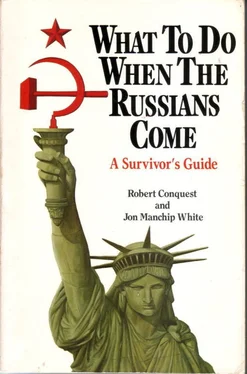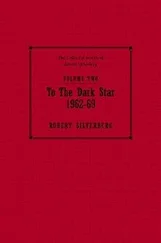Robert Conquest - What to Do When the Russians Come
Здесь есть возможность читать онлайн «Robert Conquest - What to Do When the Russians Come» весь текст электронной книги совершенно бесплатно (целиком полную версию без сокращений). В некоторых случаях можно слушать аудио, скачать через торрент в формате fb2 и присутствует краткое содержание. Город: New York, Год выпуска: 1984, ISBN: 1984, Издательство: Stein and Day Inc., Жанр: Публицистика, на английском языке. Описание произведения, (предисловие) а так же отзывы посетителей доступны на портале библиотеки ЛибКат.
- Название:What to Do When the Russians Come
- Автор:
- Издательство:Stein and Day Inc.
- Жанр:
- Год:1984
- Город:New York
- ISBN:0-8128-2985-9
- Рейтинг книги:3 / 5. Голосов: 1
-
Избранное:Добавить в избранное
- Отзывы:
-
Ваша оценка:
- 60
- 1
- 2
- 3
- 4
- 5
What to Do When the Russians Come: краткое содержание, описание и аннотация
Предлагаем к чтению аннотацию, описание, краткое содержание или предисловие (зависит от того, что написал сам автор книги «What to Do When the Russians Come»). Если вы не нашли необходимую информацию о книге — напишите в комментариях, мы постараемся отыскать её.
What to Do When the Russians Come — читать онлайн бесплатно полную книгу (весь текст) целиком
Ниже представлен текст книги, разбитый по страницам. Система сохранения места последней прочитанной страницы, позволяет с удобством читать онлайн бесплатно книгу «What to Do When the Russians Come», без необходимости каждый раз заново искать на чём Вы остановились. Поставьте закладку, и сможете в любой момент перейти на страницу, на которой закончили чтение.
Интервал:
Закладка:
Speaking of bottles, alcohol will be a tremendous temptation, as it is in all Communist countries. Since, as in all those countries, there will be little in the way of recreation, we do not take it upon ourselves to point out the obvious dangers of lapsing into apathetic soddenness. But be careful how you make home brew—both from the point of view of your health and because it will be illegal and, though usually winked at, be the subject of occasional crackdowns and exemplary sentences to forced labor.
To resume, there are all manner of household items like soap and toothpaste, needle and thread, razor blades, patching materials, flashlight bulbs and batteries, light bulbs and candles, and other odds and ends that seem trivial in time of prosperity but loom large in time of adversity. Sugar, salt, flour, matches, tea, and coffee are other staples that come to mind under this heading, and powdered milk and powdered soups might one day prove especially valuable. These things, if you lay in a stock in time, will help to see you through to when conditions are becoming comparatively better. But the most important items by far will be your reserve of medicines and vitamins. Stock up on these while they are still available and do not stint on them. At a time when sickness and malnutrition will be rife, a couple of aspirin, a cup of beef bouillon, or a spoonful of health-food supplement may save a life. You might also consider getting a quantity of water-purifying tablets.
Tea, coffee, and cigarettes are at a particular premium in the sort of gloomy breakdown that the initial phase of the Occupation will produce. Tea will be of especial value in helping you to carry on, as will coffee, although the demand for the latter will quickly lead to a breakdown in supply, and you may not find palatable the substitutes that will come on the market such as ersatz coffee made from acorns.
As for cigarettes, in postwar Europe and Asia they served as the main consolation and stimulant. We do not urge you to take up smoking again (one of us is a nonsmoker), but if you do, the risks will be negligible compared with the others facing you. If you do give in to it, you may find the sense of revivification worth it, since unlike other drugs, even alcohol, it will not blunt the edge of your vigilance. Moreover, it will not be discouraged by the Soviets, and your only real problem will be to obtain tolerable brands. The bulk of American-made cigarettes will be confiscated for use by the Soviet troops and other official bodies, and American tobacco is of such high repute in the USSR that most of the remainder will be exported, at the usual unfavorable trade terms, to Russia and other favored Communist countries. Still, there is such a large amount of tobacco in the United States that it may become, as it did in postwar Europe, a veritable unofficial currency, with a definite exchange value when the dollar itself is collapsing. We would therefore advise you, whether a smoker or not, to gather together a supply and put it to good use during the initial transition period.
With regard to hoarding valuables of other kinds, we would suggest that you forget all about money. Dollars will soon be worthless or nearly so. Gold will retain its value, but hoarding of it implies the risk of confiscation and of the labor camp. Nevertheless, as a reserve, and particularly in the case of an attempt to escape to Australia or any other better clime that may still exist, we suggest that a very small, and easily concealed, amount of gold plus a few gemstones of good quality might prove real lifesavers. Gems of great value can look very ordinary and be almost unnoticeable. A mere ounce or two might make all the difference during the process of flight, as has been a common experience in Eastern Europe.
You will also want to have a reserve of more solid property, of a kind not subject to automatic confiscation, that you can sell off from time to time, piece by piece, to help tide you through bad times and to stave off starvation.
These, if you cannot sell or barter privately, you will be able to take to a chain of State-run shops, which will buy the valuables of the ruined “privileged classes” at rates that are a fraction of their real value but that you will have to accept. Here you can dispose of jewelry, silver, pictures, and ornaments.
As for the rest of your possessions, there usually comes a time in any Soviet occupation, usually in the early stages, when most people who own valuable furniture have to sell it off for food or fuel. You should look over your household effects in good time with a view to such an eventuality. Acquire a few more chairs than you need. Choose them in a style that will appeal to the taste of the new rich class of Communist bureaucrats: ornate, pretentious, with some claim to being heirlooms handed down from members of the French aristocracy (or whatever story seems plausible). The proceeds of such a sale may keep you going for weeks or months and may also give you a useful connection with members of the new elite.
All this sounds as if you might need a good deal of space for storage. Above all, be careful to tuck your supplies out of sight not only to save room but to hide them from nosy neighbors who might come poking into your kitchen. They could be the sort of people who, if you quarrel with them (or even if you don’t), might denounce you for hoarding. When real shortages develop, anything that might be even mildly stigmatized as “hoarding” will be punishable. Your stores will in any case be liable to confiscation—not automatically, but if local or national authority so decides. We advise you, therefore, to be circumspect in your purchases, not to talk too much about them, and not to look as if you are overdoing your purchasing.
In spite of this need for some caution toward your fellow citizen, we have already implied that you should share your home with other members of your family or invite friends or neighbors to move in. There will be enough of them around whose houses have been confiscated or destroyed. If you don’t, the local Communist housing officer, even if he does not confiscate your house, is certain to take over the greater part of it to billet people who will be total strangers and some of whom will be of dubious trustworthiness. Living with people you like, you will be able to share your troubles, bringing up children, doing the shopping, standing in line, and all the day-to-day activities of a problem-packed life. Equally important, you and your new companions may find that one establishment is easier and less costly to run, if you put your minds to it, than two or more, especially in the new circumstances.
The essence of the matter, of course, is compatibility. The fact that people get on each others’ nerves at close quarters is nowhere more dramatically illustrated than in the rabbit warrens of Moscow and Leningrad, where a whole underground literature testifies to the neurotic hatreds that flourish. And yet, oddly enough, it is also a fact that people who are capable of behaving toward each other in this churlish fashion will often be found banding together in a crisis and in the face of the State and are capable of touching acts of humble heroism, self-sacrifice, and mutual help. Nevertheless, though especially if you have to receive state-sponsored billeteers, we would advise you to learn a lesson from the apartment dwellers of the Soviet Union and keep everything padlocked, even your pots and pans, and almost literally nail down anything that could possibly be filched.
Needless to say, the household ought also to take pains to stockpile beforehand anything they might need later in the form of tools, nails and screws, shingles, tar for patching holes in the roof, and so on. All these items will become virtually unobtainable after the war when present stocks are exhausted, as they will be very low on the list of objects that the occupation authorities will ordain for manufacture.
Читать дальшеИнтервал:
Закладка:
Похожие книги на «What to Do When the Russians Come»
Представляем Вашему вниманию похожие книги на «What to Do When the Russians Come» списком для выбора. Мы отобрали схожую по названию и смыслу литературу в надежде предоставить читателям больше вариантов отыскать новые, интересные, ещё непрочитанные произведения.
Обсуждение, отзывы о книге «What to Do When the Russians Come» и просто собственные мнения читателей. Оставьте ваши комментарии, напишите, что Вы думаете о произведении, его смысле или главных героях. Укажите что конкретно понравилось, а что нет, и почему Вы так считаете.












